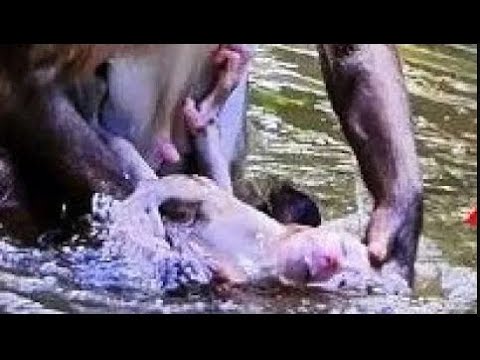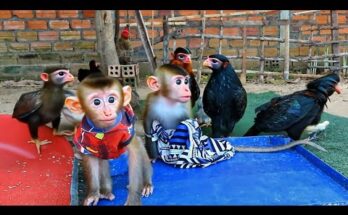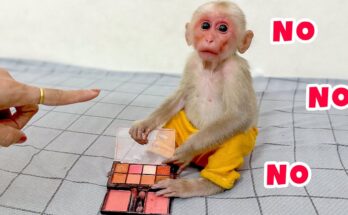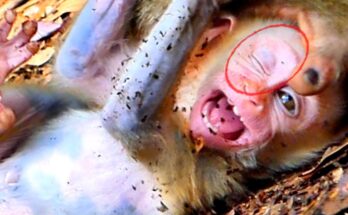
sometimes even swimming—can make the difference between life and death. But learning these skills isn’t always a gentle process. For one newly born baby monkey, a training session in a big pond turned into a frightening test of courage, made even more dangerous by a mother’s moment of carelessness.
It began on a hot afternoon. The troop had gathered near a large pond to cool off and drink. The air was filled with the splashing sounds of adults dipping their hands into the water, grooming each other along the shore, and young ones chasing dragonflies across the bank. For the baby, everything was new and exciting. The shimmering water seemed mysterious, a giant mirror reflecting the sky.
The mother, perhaps eager for her little one to adapt quickly, led the baby toward the water’s edge. She nudged it gently, encouraging it to touch the surface. At first, the baby hesitated. Its tiny hands reached forward, patting at the ripples and pulling back each time the cool water touched its fur.
Then, without much warning, the mother moved further in, expecting the baby to follow. She was confident—too confident—that her young could manage on its own. The baby tried to keep up, stepping into the shallow edge, but the pond floor dropped off quickly. In a matter of seconds, the little one found itself in deeper water, struggling to stay afloat.
Its squeals rang out in alarm. The small body paddled clumsily, splashing frantically as it tried to reach the shore. Water filled its mouth, and its eyes went wide with panic. The mother, distracted for a moment by another troop member, didn’t notice the immediate danger.
Nearby monkeys reacted first, some chattering loudly, others running to the bank. The noise caught the mother’s attention at last. In an instant, her instincts took over. She plunged into the pond, cutting through the water with powerful strokes. Reaching her terrified baby, she scooped it up into her arms and held it tightly against her chest.
The baby clung to her fur, coughing and shivering, its tiny body trembling from shock. The mother climbed out of the pond and sat on a sunlit rock, cradling her young and grooming it with rapid, reassuring strokes. For a long time, she did not let go.
Though the incident ended without injury, it was a sobering lesson. In nature, teaching a baby is not just about encouraging exploration—it’s about knowing the limits of its strength and confidence. This mother’s moment of carelessness could have cost her baby its life.
For the troop, life went on. The other monkeys returned to their splashing and play, but the mother kept her little one close for the rest of the day. The baby, still shaken, avoided the water’s edge, clinging to its mother’s side. Perhaps in time it would learn to navigate the pond with confidence, but for now, safety meant staying where her arms could reach.
The big pond, beautiful and inviting, had shown its hidden danger. For the baby, the experience was frightening—but it was also the first step in learning a skill it might one day need. And for the mother, it was a reminder that love and protection must always come before careless teaching.


